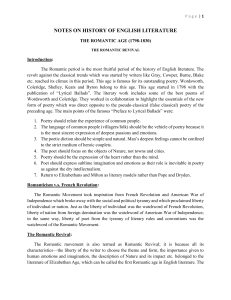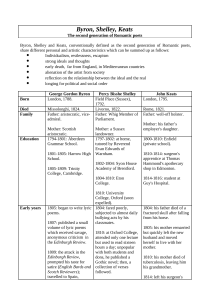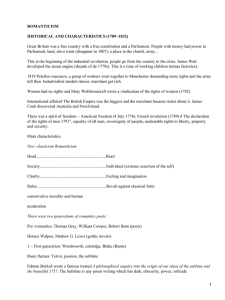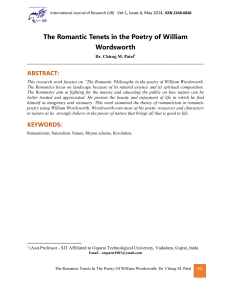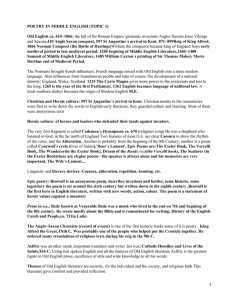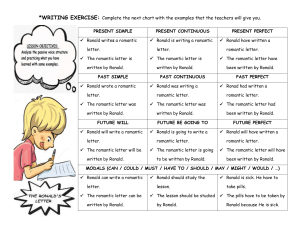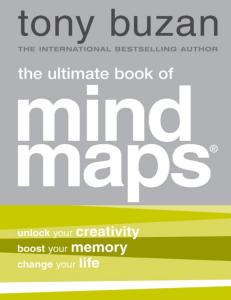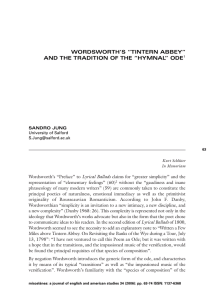ROMANTICISM. A COMPARATIVE SURVEY.
Anuncio
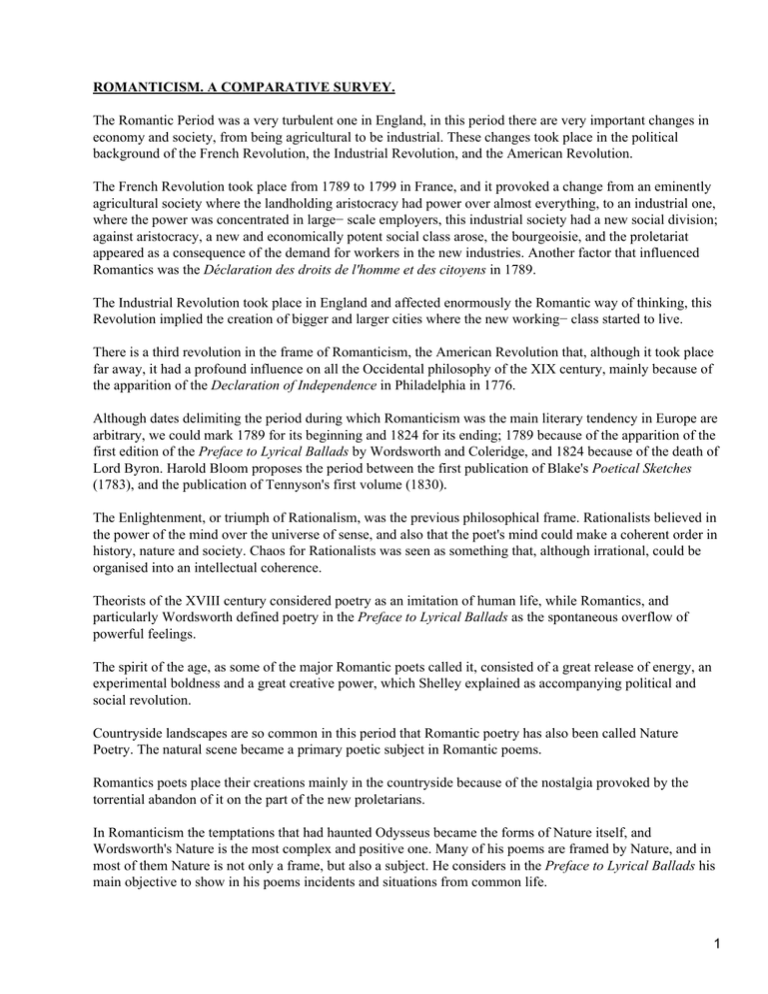
ROMANTICISM. A COMPARATIVE SURVEY. The Romantic Period was a very turbulent one in England, in this period there are very important changes in economy and society, from being agricultural to be industrial. These changes took place in the political background of the French Revolution, the Industrial Revolution, and the American Revolution. The French Revolution took place from 1789 to 1799 in France, and it provoked a change from an eminently agricultural society where the landholding aristocracy had power over almost everything, to an industrial one, where the power was concentrated in large− scale employers, this industrial society had a new social division; against aristocracy, a new and economically potent social class arose, the bourgeoisie, and the proletariat appeared as a consequence of the demand for workers in the new industries. Another factor that influenced Romantics was the Déclaration des droits de l'homme et des citoyens in 1789. The Industrial Revolution took place in England and affected enormously the Romantic way of thinking, this Revolution implied the creation of bigger and larger cities where the new working− class started to live. There is a third revolution in the frame of Romanticism, the American Revolution that, although it took place far away, it had a profound influence on all the Occidental philosophy of the XIX century, mainly because of the apparition of the Declaration of Independence in Philadelphia in 1776. Although dates delimiting the period during which Romanticism was the main literary tendency in Europe are arbitrary, we could mark 1789 for its beginning and 1824 for its ending; 1789 because of the apparition of the first edition of the Preface to Lyrical Ballads by Wordsworth and Coleridge, and 1824 because of the death of Lord Byron. Harold Bloom proposes the period between the first publication of Blake's Poetical Sketches (1783), and the publication of Tennyson's first volume (1830). The Enlightenment, or triumph of Rationalism, was the previous philosophical frame. Rationalists believed in the power of the mind over the universe of sense, and also that the poet's mind could make a coherent order in history, nature and society. Chaos for Rationalists was seen as something that, although irrational, could be organised into an intellectual coherence. Theorists of the XVIII century considered poetry as an imitation of human life, while Romantics, and particularly Wordsworth defined poetry in the Preface to Lyrical Ballads as the spontaneous overflow of powerful feelings. The spirit of the age, as some of the major Romantic poets called it, consisted of a great release of energy, an experimental boldness and a great creative power, which Shelley explained as accompanying political and social revolution. Countryside landscapes are so common in this period that Romantic poetry has also been called Nature Poetry. The natural scene became a primary poetic subject in Romantic poems. Romantics poets place their creations mainly in the countryside because of the nostalgia provoked by the torrential abandon of it on the part of the new proletarians. In Romanticism the temptations that had haunted Odysseus became the forms of Nature itself, and Wordsworth's Nature is the most complex and positive one. Many of his poems are framed by Nature, and in most of them Nature is not only a frame, but also a subject. He considers in the Preface to Lyrical Ballads his main objective to show in his poems incidents and situations from common life. 1 Lines Written in Early Spring I heard a thousand blended notes, While in a grove I sate reclined, In that sweet mood when pleasant thoughts Bring sad thoughts to the mind To her fair work did Nature link the human soul that through me ran; And much it grieved my heart to think What man was made of man Through primrose tufts, in that green bower, The periwinkle trailed its wreaths, And `tis my faith that every flower Enjoys the air it breathes. The birds around me hopped and played, Their thoughts I cannot measure:− But the least motion which they made, It seemed a thrill of pleasure. The budding twings spread out their fan, To catch the breezy air: And I must think, do all I can, That there was pleasure there. If this belief from heaven be sent, If such be Nature's holy plan, Have I not reason to lament What man was made of man? In this poem we can see the way Wordsworth uses Nature as a frame for his philosophical background, there is a strong inward sinking in most of his Nature poems. 2 Wordsworth rejected urban life and desired to live near to and in contact with Nature and although in his times Nature was considered as something strange by most of the people, Wordsworth looked at its less common aspects. William Blake was referred to as to the Poet of Nature. He considered Nature as a mythological figure whom he called Rahab, Tirzah, or Vala. Tirzah was the capital of Israel and Blake conceived it in opposition to Jerusalem, capital of Judah, he represents it in his poem To Tirzah as the mother of the mortal body, that is to say, as fulfilling the functions that belong to Nature: To Tirzah Whate'er is Born of Mortal Birth Must be consumèd with the Earth To rise from Generation free; Then what have I to do with thee? The Sexes sprung from Shame & Pride, Blow'd in the morn, in evening died; But Mercy changed Death into Sleep; The Sexes rose to work & weep. Thou, Mother of my Mortal part, With cruelty didst mould my Heart, And with false self− deceiving tears Didst blind my Nostrils, Eyes, &Ears. Didst close my Tongue in senseless clay And me to Mortal Life betray. The death of Jesus set me free; Then what have I to do with thee? Coleridge was more afraid of profaning Nature than even Wordsworth was. Poems like Wordsworth's Lines Composed a Few Miles above Tintern Abbey and Ode: Intimations of Immortality , Coleridge's Frost at Midnight and Dejection: an Ode, Shelley's Ode to the West Wind and Keats's Ode to a Nightingale begin with a particular aspect or a change of aspect in the Nature scene, which serves to the poet as an stimulus to thinking about some emotional problem or personal crisis whose development coincides with the organising structure of the poem. Romantics poets tend to endow the landscape with human life, its passion, and expressiveness. Specially 3 Blake and Shelley have a tendency to write a symbolist poetry in which elements from Nature acquire a significance beyond itself, this is the case of poem such as Blake's The Sick Rose. The Sick Rose O Rose, thou art sick. The invisible worm That flies in the night In the howling storm Has found out thy bed Of crimson joy, An his dark secret love Does thy life destroy. Although they are not very numerous there are also poems taking place in a urban landscape, such as London, by William Blake: London I wander thro' each charter'd street, Near where the charter'd Thames does flow, And mark in every face I meet Marks of weakness, marks of woe In every cry of Man, In every Infant's cry of fear, In every voice, in every ban, The mind forg'd manacles I hear: How the Chimney−sweeper's cry Every blackming Church appalls, And the hapless Soldier's sight Runs in blood down Palace walls. But most thro' midnight streets I hear 4 How the youthful Harlot's curse Blasts the new− born Infant's tear, And Blights with plagues the Marriage hearse. Imagination is the greatest of the Romantic characteristics. In Wordsworth the obsession with Imagination reveals an obsession with the self. He referred to Imagination as a glorious faculty, but neither he nor his contemporaries considered it as a faculty amongst many making up he human endowment. Blake was, among all major Romantic poets, the only one who denied that it was a faculty at all, he identified Imagination with what he called the Real Man, that is, with the unfallen human potential. There is a tendency to insist upon that Imagination or creative power has to be considered as something autonomous, because it is able to perceive and half− create reality and truth in a better way than any other human mode of apprehension. The centre of the consciousness of the Romantics is found in the difficult realisations of the Sublime on the part of that poets, in Wordsworth we have to consider the Sublime in the sense that all other beings and the external world are unreal compared with the poet's own excited self− consciousness. These realisations of the Sublime internalise the quest− pattern of romance, so, the poet would have the role of the quester, the selfhood, or excessive consciousness, his antagonist, and the Muse figure, his goal. In that sense of the word, consciousness would become the central Romantic characteristic. As we have already said Wordsworth defined poetry in The Preface to Lyrical Ballads as the spontaneous overflow of powerful feelings, but latter on the same paragraph he adds that a poem originates from emotion recollected in tranquillity and that it must be preceded and followed by reflection. Keats asserted that poetry must come naturally to the mind, that it must be spontaneous to be good poetry. In this same trend Shelley declared in A Defence of Poetry that it is an error to assert that the finest passages of poetry are produced by labor and study. Coleridge, the Poet of Imagination, considers the fact of composing poetry as the sum of spontaneous and voluntary impulse, and dedicates one of the most beautiful chapters of his Biographia Literaria to analyse it: The primary Imagination I hold to be the living Power and prime Agent of all human Perception, and as a repetition in the finite mind of the eternal act of creation in the infinite I am. The secondary Imagination I consider as an echo of the former, co−existing with the conscious will, yet still as identical with the primary in the kind of its agency, and differing only in degree, and in the mode of its operation. It dissolves, diffuses, dissipates, in order to recreate; or where this process is rendered impossible, yet still at all events it struggles to idealise and to unify. It is essentially vital, even as all objects (as objects) are essentially fixed and dead Shelley in A Defence of Poetry distinguishes between two classes of mental action: Reason and Imagination, and defines the former as mind contemplating relations between thoughts, and the latter as mind acting upon thoughts in order to colour them with its own light and composing from them other thoughts, each containing its principle of integrity. The intense love that Romantic poets felt towards Imagination was enforced by religious and metaphysical considerations. During almost one century the English philosophical frame was dominated by Locke, who thought the mind was something passive whose function was to register the impressions of the outer world. The mecanicist explanation of the world gave little attention to human conscious and to its convictions. Blake 5 thought that philosophy must be considered as an enemy to existence because it destroys its marvels. In this point Keats coincided with Blake, and, although in a passage from Lamia he seems to exalt sensations at the expense of intelligence, what he actually does is to insist upon the fact that Imagination is more important that analytic reason: /.../ Do not all charms fly At the mere touch of philosophy? There was an awful rainbow once in heaven: We know her woof, her texture; she is given In the dull catalogue of common things. Romantic writers were far from thinking that intelligence has no importance to poetry, but insisted upon that this intelligence and thought must be imaginative and must concentrate not only in the general nature of things but also in their quality. Romantics thought that God was in every work of Nature and in Poetry and that religion was a question of feeling, more than of Reason. On the contrary Locke considered poetry as a mere question of wit, and wit was beheld as something irresponsible an that did without reality. Blake and Coleridge attacked the whole system proposed by Locke because it deprived the human being of his importance and substituted it with their own system, called idealist because Imagination was its central point and guide, and as they were poets, they considered that Imagination was the most vital activity of the mind. Wordsworth, Shelley and Keats considered that Imagination was linked somehow with a supernatural order of things which was related to true and reality and that is that relation what poets tried to express in poetry. Imagination is able to see things that are invisible to common intelligence thanks to a close perception and intuition. Intuition and Imagination constitute a unique faculty. They firmly believed that material things, although they near us to reality, were not important because they would have little or no signification at all if they were not related with a involving power, an objective true that is the one that rules over our thoughts. And it is always this objective true the one that serves as inspiration to Romantics and made poets from them. Romantics behold that spiritual forces can only be represented by particular examples, all of them, particularly Blake, considered that only idiots generalise, and they did so because they lived in Imagination and nothing had a complete signification without a particular form. They were convinced that art was to be made by presenting, in a most vivid way, everything taking place in Imagination in order to give them the status of concrete events. Kubla Khan, for instance, is a good example of how tangible can be the representation of something that has been seen through the eyes of dream. Romantic poets saw the sensitive world as the most appropriate tool for making use of their visionary powers true. Kubla Khan ... 6 And all should cry, Beware! Beware! His flashing eyes, his floating hair! Weabe a circle round him thrice, And close your eyes with holy dread, For he on honeydew hath fed, And drunk the milk of Paradise. Blake declared that it is Imagination which makes a poet what he is, because it is Imagination which creates reality. He considered that every living being was a symbol of eternal powers, and these powers were his main concerns, so he also looked for them in writing a poem or painting. He was most interested in the sense of reality that slept, with a metaphorical shape, in those powers. Blake uses different ways of representing the same vision of men and women, this alteration has as result the dehumanisation and alienation of the nature of the cosmos. Keats, as Blake, considered that reality can only be discovered through Imagination, as it is shown in his poem Sleep and Poetry: Is there so small a range In the present strength of manhood, that the high Imagination cannot freely fly As she was wont of old? Prepare her steeds, Paw up against the light, and so strange deeds Upon the clouds? Has she not shown us all? From the clear space of ether, to the small Breath of new buds unfolding? From the meaning Of Jove's large eye− brow, to the tender greening Of April meadows? Coleridge, although he has a great concern with Imagination, thinks that he must adapt himself to the external world. He believed that the fact of creating had its own transcendentality. The term Coleridge took to refer to Imagination is the German word Einbildungskraft because it expressed the faculty of making a unity with the multiplicity. Wordsworth thought, as Coleridge did, that the capacity of Imagination is equal to the capacity that God has of creating, but he considered that the poet had to add a special vision to it. He does not put Reason in a second plane, as many other poets do, because he believed the inspired vision to be rational by itself. Wordsworth's conception of the material world is that it can and actually does rule over Imagination, because 7 it is not dead, and it has its own soul, with which men can not avoid a contact. Shelley thought that Reason had to relate somehow with Imagination, and decided that Reason's function was to analyse things for the Imagination to use as instruments to the creation of a world of armony. He considered the poet as a sort of a prophet with a capacity to perceive the reality of Nature. Shelley adopted the platonic theory of knowledge and applied it to beauty, the task of the poet would be then to discover the absolute reality in its particular examples. This task is spiritual in the sense that it implies the use of the highest faculties of the human being, and also because it gives sense to his transitory sensations. Lord Byron denied the importance of Imagination and did not believe in a transcendental order of things. The ideal of Beauty exalts a sort of experiences leaving others aside. Romantic writers considered that something was beautiful when its effect upon them was that it dominated their senses elevating them towards a vision of the other world. They thought that Beauty is a quality of reality and tried to find it. In practice they tended to think that Beauty is confined in the sphere of Love, although they admitted the possibility of finding it anywhere. In practice their conception of Beauty was limited by their beliefs. The first person is the dominating in most of Romantic works, that is so because according to Romantics poetry expresses the poet's own feelings, if this is true, then the lyric poem written in the first person will be the most important of Romantic lyric compositions. The I is no more a conventionally typical writer, such as Petrarchan poets were, it is now the reality of the poet, that is, the poet does not use a literary mask, but expresses himself without hiding from the outer world, and thus we are able to perceive important traits of the poet, his life and his circumstances in his works. Wordsworth, Coleridge, Shelley and Keats's compositions usually reflect the same circumstances of their lives as their journals and letters do, even Lord Byron presents his heroes identifying them with himself. A typical example of this identification between the lyric I and the poet would be Wordsworth's The Prelude. Romantic poets tend to see themselves as bards, that is, they think that they have been chosen to be the spokesmen of the Western civilisation. Wordsworth, for instance, and also the other poets tried to revise the promise of redemption made by The Bible, in this way their intention is to renew hope on the part of Christians and to advise them from the arrival of a time in which the humanity will be new and will inhabit in a renewed earth. Another very important Romantic literary form consists on an essay on the formation of the self, centring normally on a crisis, and presenting it in the form of a journey in quest of one's true identity and spiritual home. The most important examples of this literary form are Shelley's Prometheus Unbound, Blake's Milton, Keats's Endymion: A Poetic Romance and The Fall of Hyperion: A Dream, and Wordsworth's The Prelude. There also some prose examples of this form, such as Coleridge's Biographia Literaria. A radical individualism is another of the most important features of the Romantic period, in fact, Romantic writers did not refer to themselves as Romantic, they were treated as individuals although some critics grouped them into several schools such as the Lake School, with Wordsworth, Coleridge and Southey, the Cockney School, with Hunt, Hazlitt and Keats, or the Satanic School with Byron and Shelley. These poets insisted upon the point that Imagination (and poetry) had to be related to reality, but Byron, in his beginnings, built his poetry not on the basis of the truth of his own reality, but on the image he wanted the people to have of him. Romantic poets and philosophers were very fond of human capacities and abilities, because they considered 8 the human being the most important thing in the Universe. This philosophy of individualism has been inherited by Romantics from the German post− Kantian philosophy, in which the human mind, called Subject or Ego, were not considered as a mere mirror of the universe, they thought that the mind created its own experience, that is to say, by rejecting the material world, the mind was able to take part on God's work. Coleridge stated that the mind is not something passive, he says that it is made in the image of God. Romantic desires were beyond the human limits, and are just the opposite to rationalist ones. These poets have the intention of reaching inaccessible goals, because they consider life as something one must use to conquer the infinite. The belief on the power of human Mind and Imagination is more evident in literature than in any other form of expression and, in this way, we can refer to works in which there are a very prophetic sense such as The Rime of the Ancient Mariner, by Coleridge, in which the death of the Albatross brings all sort of disgraces to the crew of the ship, and they do not end until the moment in which the Mariner throws the Albatross's corpse into the sea. The Rime of the Ancient Mariner Part 4 the self−same moment I could pray; and from my neck so free The Albatross fell off, and sank Like lead into the sea. Part 5 The silly buckets on the deck, that had so long remained, I dreamt that they were filled with dew; And when I awoke, it rained. Consulted bibliography: • Abrams, M. H. (ed): The Norton Anthology of English Literature, New York: W. W. Norton & Company, 1993. • Bloom, Harold & Trilling, Lionel: Romantic Prose and Poetry, London: Oxford University Press, 1973. • Bowra, Maurice: The Romantic Imagination, London: Oxford University Press, 1934. 9 • Gran Enciclopedia Larousse: Barcelona, Planeta, 1996. • O'Flinn, Paul: How to Study Romantic Poetry, London: Macmillan, 1988. • Wellburn, Andrew J.: The Truth of Imagination, London: Macmillan, 1989. 10
